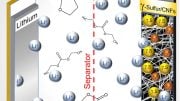
Sulfur is a key ingredient in many fertilizers, thus a shortage could create an issue with food production.
As the globe decarbonizes, a possible resource crisis is on the horizon.
According to a recent study led by University College London (UCL) scientists, a projected shortage of sulfuric acid, a key chemical in our modern industrial society, might hinder the development of green technology and jeopardize global food security.
According to the study, which was published recently in The Geographical Journal, increased agricultural productivity and the worldwide shift away from fossil fuels would cause the demand for sulfuric acid to increase considerably from “246 to 400 million metric tons” by 2040.
Depending on how quickly decarbonization takes place, the researchers project that this will result in an annual supply shortfall of between 100 and 320 million metric tons, or between 40% and 130% of the current supply.
Sulfuric acid, a crucial component of modern manufacturing, is required for the manufacturing of phosphorus fertilizers that contribute to world food production and for the extraction of rare metals from ores crucial to the transition to a rapidly necessary green economy, such as cobalt and nickel used in high-performance Li-ion batteries.
Over 80% of the world’s sulfur supply is now in the form of sulfur waste from the desulfurization of crude oil and natural gas, which minimizes sulfur dioxide gas emissions, that can cause acid rain. However, decarbonizing the global economy in response to climate change would dramatically diminish the output of fossil fuels – and therefore the supply of sulfur.
This study, led by UCL researchers, is the first to identify this major issue. The authors suggest that unless action is taken to reduce the need for this chemical, a massive increase in environmentally damaging mining will be required to fill the resulting resource demand.
Study lead author, UCL Geography Professor Mark Maslin said: “Sulfur shortages have occurred before, but what makes this different is that the source of the element is shifting away from being a waste product of the fossil fuel industry. What we’re predicting is that as supplies of this cheap, plentiful, and easily accessible form of sulfur dry up, demand may be met by a massive increase in direct mining of elemental sulfur. This, by contrast, will be dirty, toxic, destructive, and expensive.”
He continues, “Research is urgently needed to develop low-cost, low environmental impact methods of extracting large quantities of elemental sulfur from the abundant deposits of sulfate minerals in the Earth’s crust. The international community should consider supporting and regulating sulfur mining to minimize the impacts of the transition and also to avoid cheap unethical production from distorting the market.”
Study co-author Dr. Simon Day (UCL Institute for Risk & Disaster Reduction) said: “Our concern is that the dwindling supply could lead to a transition period when green tech outbids the fertilizer industry for the limited more expensive sulfur supply, creating an issue with food production, particularly in developing countries.”
To arrive at their conclusions, the researchers estimated three sulfuric acid demand scenarios from 2021 to 2040, based on historical and predicted demand, with annual growth rates ranging from 1.8% to 2.4%.
The authors also investigate several ways that sulfur demand could be reduced as part of the transition to post-fossil fuel economies, such as recycling phosphorus in wastewater for the fertilizer industry, increasing lithium battery recycling, or using lower energy capacity/weight ratio batteries, which require less sulfur for production.
In addition, they prompt crucial questions about whether it would make economic sense to invest in alternative production methods, given it is not currently possible to predict how quickly the supply of sulfur as a waste product from oil and gas desulfurization will decrease as the decarbonization of the global economy is only just starting.
However, they conclude that by recognizing the sulfur crisis now, national and international policies can be developed to manage future demand, increase resource recycling, and develop alternative cheap supplies.
Reference: “Sulfur: A potential resource crisis that could stifle green technology and threaten food security as the world decarbonises” by Mark Maslin, Livia Van Heerde and Simon Day, 21 August 2022, The Geographical Journal.
DOI: 10.1111/geoj.12475









Please stop crying wolf. You sperggy nerds are really getting annoying.
H2SO4 is often used simply because it is a cheap byproduct, not because it is uniquely suited for the task. For instance, highly caustic waste must be neutralized with acid, any acid before disposal.
If H2SO4 became valuable, mining, and smelting could be done in the US, rather than somewhere with less stringent regulations, because it would be cost effective to recover the sulfur.
In the case of the fertilizer ammonium sulfate, sulfur is critical and therefore H2SO4 IS “uniquely suited for the task.”
And, unlike ammonium nitrate, ammonium sulfate is not potentially explosive.
Other acids that might potentially be used to replace sulfuric acid are not directly interchangeable because the products of neutralization (chlorides and nitrates) from other strong acids are more soluble than sulfates and there is greater risk of contaminating ground water.
“Smelting” is not a process used in producing either sulfur or sulfuric acid.
Lithium-ion battery technology is not really adequate for a transition to an electrified society. For that reason, Lithium-Sulfur batteries have been proposed.
https://scitechdaily.com/breakthrough-in-cathode-chemistry-clears-path-for-more-sustainable-lithium-sulfur-batteries/
Should they be adopted, there would be an increased demand for a dwindling supply of sulfur. Those powers-that-be who are in charge of the energy revolution are unaware of such important details.